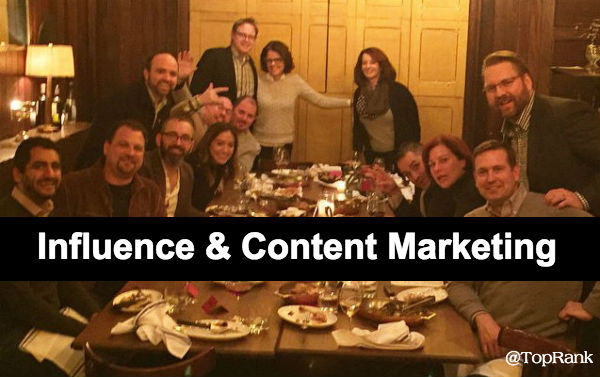
Much of influencer marketing is about advocacy and as the industry matures and includes more digital marketing intentions than PR, I believe influencers will be viewed more as partners than simple proxies for message distribution.
Or at least as chatty dinner guests like the motley crew pictured above from a NewsCred influencer dinner (LtoR: Rohun, Bryan, Joe C., Alicianne, Joe P., Chad, Jon, Drew, Ann, Sheryl, Michael, Rebecca, Moi and Michael.)
It’s a very surreal experience sometimes being treated as an industry influencer one moment and then working on influencer marketing programs the next. But hey, I’m not complaining. Seeing both sides helps me empathize and pass those insights on to our consultants and clients.
Everyone is influential about something.
My view is that everyone is influential about something and because of ubiquitous internet connectivity, content and media creation technology and the growing drive to publish anywhere, anytime, people are more empowered than ever to create credibility and grow their own networks of influence.
But how are companies taking advantage of that influence?
Working with industry experts to co-create content over the past 5-6 years has taught me that influencer marketing shouldn’t be solely focused on connecting with popular people, but helping people become popular – for things that the community and the brand value.
Numerous influencer marketing programs have also taught me that it is a formidable and time consuming endeavor to create relationships with important people and inspire them to collaborate on content in a way that meets a brand’s marketing objectives.
Content is the perfect object of mutual value exchange between brands and influencers.
Even with a substantial investment in relationship building and time, content is the perfect object of mutual value exchange between brands and influencers.
The mutual benefit of content co-creation for both brands and contributors is fundamental: The influencers get exposure to the brand community and the brand gets exposure to better quality content shared with an entirely new audience.
Brandividuals are popular. Influencers create popularity.
Make no mistake, the demand for influencer marketing is increasing fast and the benefits are much bigger than advocacy.
Here’s why: As consumers become increasingly numb to formal marketing messages and advertising, their trust in information from peers, social network connections and industry experts has increased. That leaves some popular advertising formats out in the cold and the brands that rely solely on paid media for amplification even colder.
A few interesting statistics about influencer marketing:
- 84% of B2B buyers start the purchasing process with a referral. (LinkedIn)
- 92% of consumers rely on referrals from people they know above all else (TapInfluence)
- 3% of the participants in any online conversation yields over 90% of the ‘results’ (Traackr)
- 81% of those surveyed considered influencer engagement to be effective or very effective for meeting their objectives (Augure)
- $6.85 for every $1 spent – This is the average media value earned by brands who implemented influencer marketing. (Burst Media / RhythmOne)
That all sounds promising, but there is a significant challenge to create scalable, effective influencer marketing programs. While there is increasing expertise, best practices and solutions, those involved with planning, implementing and measuring the performance of influencer marketing programs don’t always have the right tools.
At their core, Influencer Marketing tools serve as a sort of search engine to identify people who are topically relevant and that have reach. But those features are simply table stakes for influencer marketing in 2016 and beyond.
Sophisticated marketers will begin to use tools to better distinguish between different kinds of influencers and the characteristics that make them the best match for marketing programs. Managing different types of influencers at different stages of engagement takes more than a influencer search engine. Maintaining ongoing relationships with influencers is essential as is the ability to leverage influencer analytics for program performance management and optimization.
At our marketing agency, we’ve worked with various influencer marketing tools for several years. Many of those tools have made great improvements to provide a platform that supports influencer discovery, engagement, program management and measurement. In fact, we have worked so well together, Traackr recently became a client of our agency.
Wish List: Influencer Content Platform. As the categories of content marketing and influencer marketing software converge, I think we’ll start to see content platforms and planning tools that will integrate better with specialty influencer marketing tools so marketers can leverage influencer, social search and web analytics in the same content marketing process.
From topic ideation to quote-sourcing to measuring and optimizing the performance of influencer content sharing, an integrated influencer content platform would provide brands with an effective means to increase content quantity, quality and reach at scale.
Influencer Marketing tools are only as effective as the expertise of the people using them.
Being effective with scalable influencer marketing and influencer content programs specifically, requires new expertise that most companies simply don’t have. That’s why it’s important to partner with agencies that have been testing, implementing and iterating both the science of software and the art of relationship building when it comes to content and influencer marketing.
Build influencer relationships and expertise with software, long before you need it. Success with influencer content is so much more than including a few famous people in a listicle post or quote roundup. Competition for influencers is growing fast and there are only so many top influencers in each industry. It’s essential to create relationships now, long before you need to activate them. At the same time, expertise with influencer marketing strategy, planning, tactics and tools are essential and it takes time to acquire that expertise. Companies that make investments in their ability to be effective with a broad scope of influencer engagement from relationships to platforms will have a distinct competitive advantage over competitors who wait to begin the hard work of influencer engagement until they launch a campaign.


